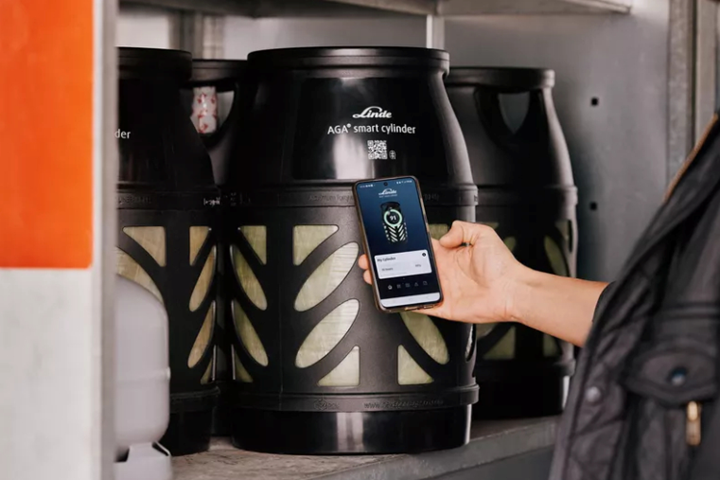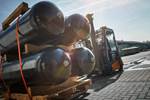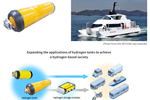Hexagon Ragasco launches Linktra Smart cylinders in Norway
Fiberglass pressure vessels with IoT provide real-time insight into refilling needs for LPG consumers.

Source | Hexagon Regasco
Hexagon Ragasco (Raufoss, Norway), a business of Hexagon Composites (Oslo, Norway), and Linde (Dublin, Ireland), a global industrial gas company and LPG marketer, has launched composite Linktra Smart cylinder nationwide in Norway. The launch follows a regional pilot program that took place during summer 2023 in the city of Oslo and its surrounding area.
Linktra Smart cylinders, deployed under the name AGA Smart Cylinders, are developed in a three-step, fully automated manufacturing process: An inner liner of polyethylene (HDPE) is blow molded; glass fiber-reinforced composite material is wound around the line; and an outer layer, an HDPE casing, is added, both to provide protection and ergonomic grip and to enable customers to brand their pressure vessels. Hexagon Regasco notes that is has exclusively manufactured Type 4 cylinders for over two decades.
Notably, the company’s Linktra Smart cylinders comes with an Internet of Things (IoT) offer that enables the connection of the cylinder to consumers’ mobile phones, allowing them to quickly see gas level and receive push notifications when it is time to refill. Linktra also connects to the IT systems of LPG distributors, providing insight into consumer-usage patterns, enabling optimized logistics — which means the cylinder is always in stock when a customer is ready to refill.
“The AGA Smart Cylinder allows users to have full control of the LPG cylinder gas level for their domestic or leisure activities,” says Morten Roness, head of consumer sales Norway, Linde. “At the same time, we at Linde, obtain real-time data to optimize our logistic operations and product availability for customers.”
The cylinders are available in most of Linde’s distribution points and vending machines nationwide.
Related Content
-
JEC World 2023 highlights: Recyclable resins, renewable energy solutions, award-winning automotive
CW technical editor Hannah Mason recaps some of the technology on display at JEC World, including natural, bio-based or recyclable materials solutions, innovative automotive and renewable energy components and more.
-
Recycling end-of-life composite parts: New methods, markets
From infrastructure solutions to consumer products, Polish recycler Anmet and Netherlands-based researchers are developing new methods for repurposing wind turbine blades and other composite parts.
-
Update: THOR project for industrialized, recyclable thermoplastic composite tanks for hydrogen storage
A look into the tape/liner materials, LATW/recycling processes, design software and new equipment toward commercialization of Type 4.5 tanks.
















